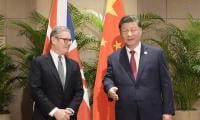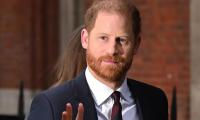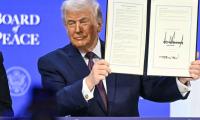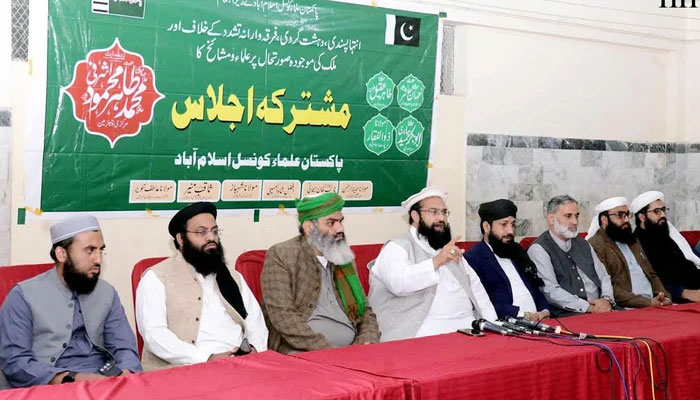Ashrafi urges pilgrims to follow Saudi Arabia’s laws during sacred journey
It was a journey of spiritual enlightenment, a communion with divine, not a platform for worldly agendas: says Ashrafi
ISLAMABAD: Pakistan Ulema Council (PUC) Chairman Hafiz Muhammad Tahir Mehmood Ashrafi on Tuesday urged the pilgrims to follow the codal formalities of Saudi Arabia in letter and spirit during sacred journey.
Talking to media on Tuesday, Ashrafi emphasized that the Two Holy Mosques were places of worship alone and they were not arenas for political expression or displays of nationalism. “Raising slogans, flags, or engaging in any other irrelevant activity is not allowed within these hallowed walls,” he proclaimed.
Ashrafi said in the heart of the Kingdom of Saudi Arabia, where the sands of time meet the echoes of eternity, stood the Two Holy Mosques in Makkah and Medina, revered by millions as the holiest sites in Islam. “Guarding the sanctity of these sacred grounds was not just a duty but a profound responsibility of all of us to oversee the affairs of these revered places,” he maintained.
Reminding the true purpose of pilgrimage, Ashrafi said it was a journey of spiritual enlightenment, a communion with the divine, not a platform for worldly agendas.
He remained steadfast in his commitment to uphold the purity of the holy sites. Through education and outreach, he sought to instill in worshippers a deep reverence for the sanctity of these sacred places, reminding them of their sacred duty to preserve and protect these sacred spaces for generations to come.
He said the Two Holy Mosques stood as beacons of light in a world shrouded in darkness. “They were not just monuments of stone but symbols of hope, unity, and faith—a testament to the enduring power of devotion in an ever-changing world,” he added.
-
 Brooklyn Beckham Set To Make More Bombshell Claims In Prince Harry Style: Deets
Brooklyn Beckham Set To Make More Bombshell Claims In Prince Harry Style: Deets -
 Prince William Arrives In Bristol To See UK's Most Poweful Supercomputer Isambard-AI
Prince William Arrives In Bristol To See UK's Most Poweful Supercomputer Isambard-AI -
 Dog Dies After Florida Woman Allegedly Sets Neighbour’s House On Fire
Dog Dies After Florida Woman Allegedly Sets Neighbour’s House On Fire -
 AI Will Create Jobs, Not Just Replace Them, Says Nvidia CEO
AI Will Create Jobs, Not Just Replace Them, Says Nvidia CEO -
 Hyundai Labour Rebels Against Robot Deployment, Warns Of Employment Risks
Hyundai Labour Rebels Against Robot Deployment, Warns Of Employment Risks -
 Reviving The ‘Golden Era’: How The New UK-China Partnership Seeks To Strengthen Bilateral Economic Ties
Reviving The ‘Golden Era’: How The New UK-China Partnership Seeks To Strengthen Bilateral Economic Ties -
 Prince Harry Shows Support To Elizabeth Hurley In Court After His Emotional Testimony
Prince Harry Shows Support To Elizabeth Hurley In Court After His Emotional Testimony -
 Amelia Gray Reflects On Her Unconventional Career Journey
Amelia Gray Reflects On Her Unconventional Career Journey -
 Heath Ledger, 'Dark Knight' Star, Remembered On 18th Anniversary
Heath Ledger, 'Dark Knight' Star, Remembered On 18th Anniversary -
 Trump Launches ‘Board Of Peace’ In Davos: Inside Governance, Mandate & Members
Trump Launches ‘Board Of Peace’ In Davos: Inside Governance, Mandate & Members -
 Martin Short Almost Ruined Key Moment Of Selena, Benny's Wedding: Deets
Martin Short Almost Ruined Key Moment Of Selena, Benny's Wedding: Deets -
 This Pixel Phone Feature May Leak Your Calls: Report
This Pixel Phone Feature May Leak Your Calls: Report -
 Ubisoft: Shares Plunge Amid Restructuring Plan And Wave Of Games Cancellations
Ubisoft: Shares Plunge Amid Restructuring Plan And Wave Of Games Cancellations -
 Meghan Markle 'not Anxious' About Prince Harry Moving To UK: Here's Why
Meghan Markle 'not Anxious' About Prince Harry Moving To UK: Here's Why -
 Vaccines May Do Far More Than Prevent Infections
Vaccines May Do Far More Than Prevent Infections -
 Apple Plans To Roll Out Siri AI Chatbot By 2026
Apple Plans To Roll Out Siri AI Chatbot By 2026




